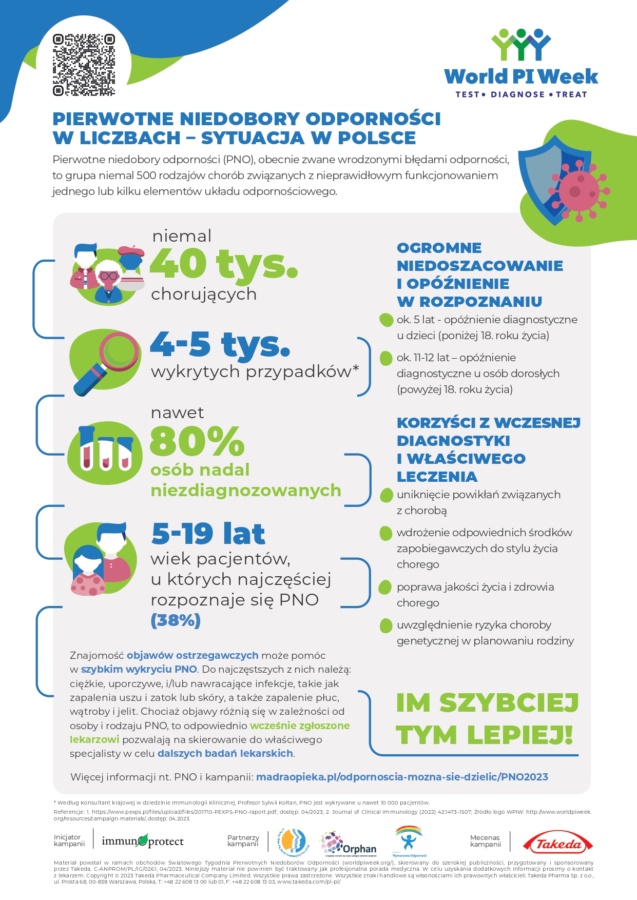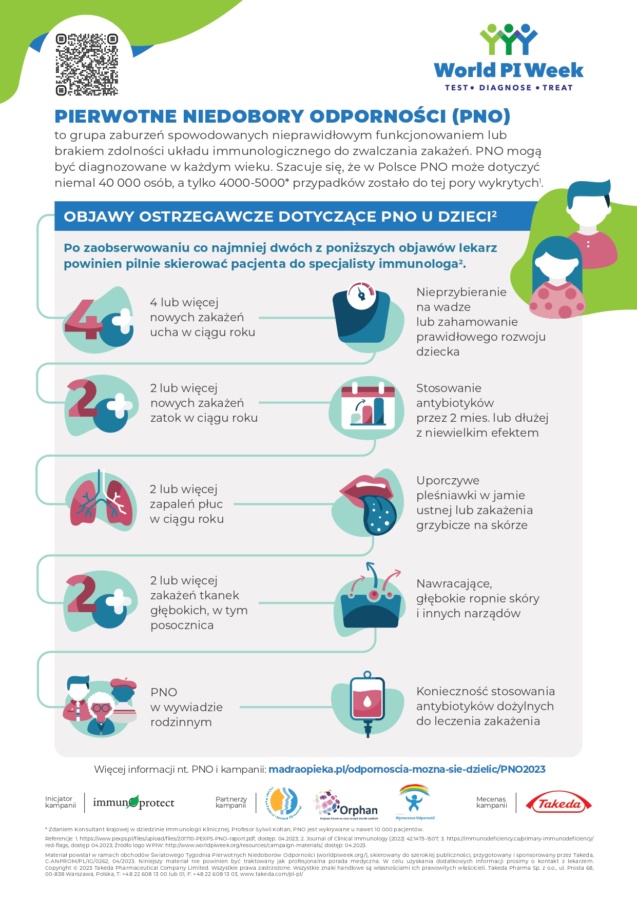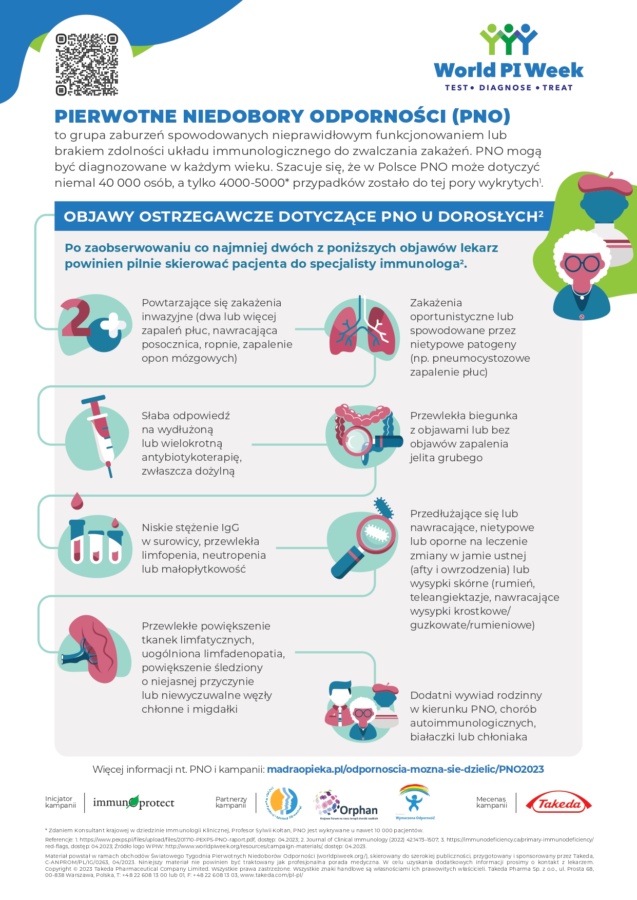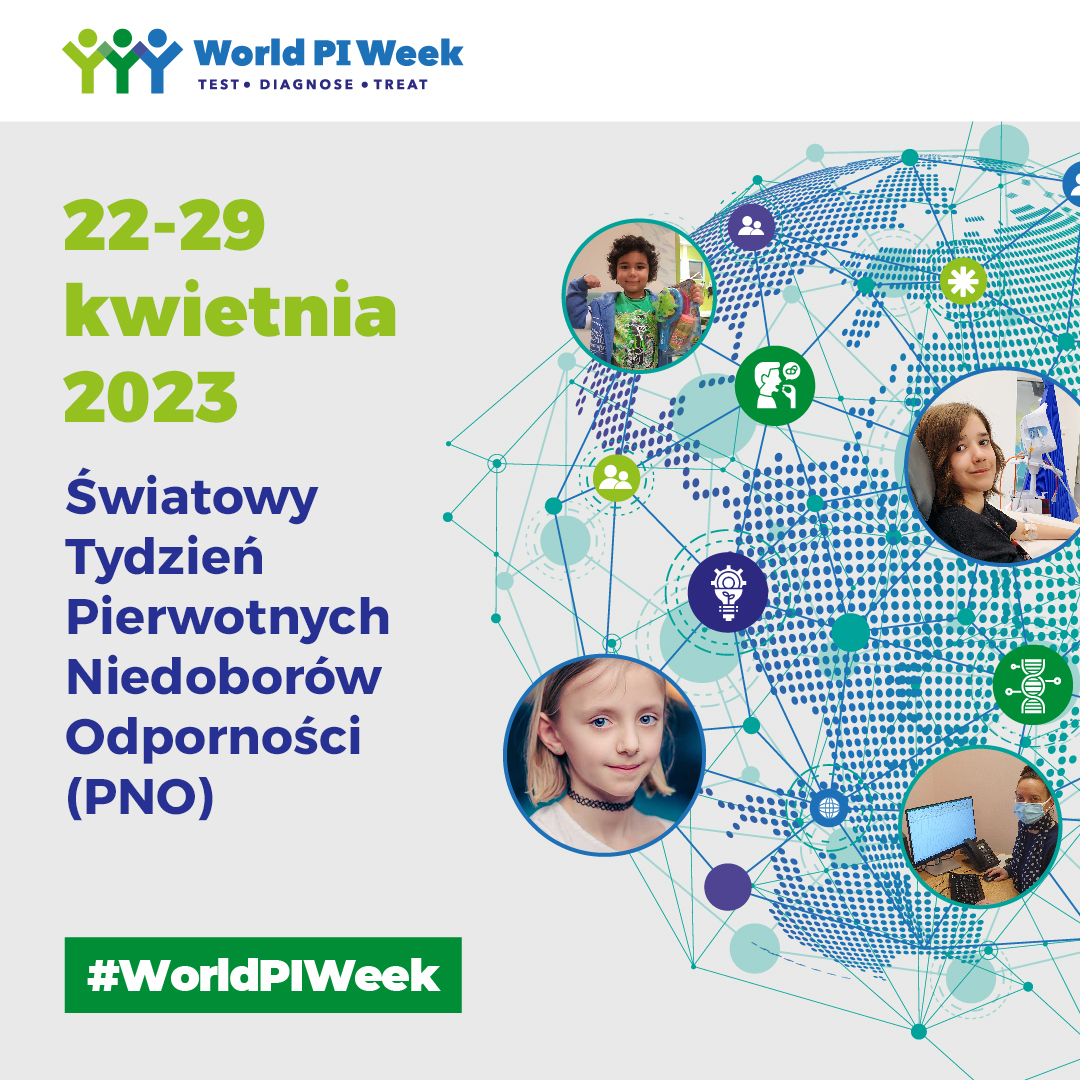Education, vigilance, cooperation - how to accelerate the diagnosis of NSAIDs in children?
- Primary immunodeficiencies (PNOs), now known as congenital immunodeficiencies, are a group of almost 500 types of diseases associated with the malfunction of one or more elements of the immune system responsible for fighting infections in the body.
- PNO can be diagnosed at any age. Time is of the essence in diagnosing the disease. Early detection of NSAIDs and the use of appropriate treatment can reduce infections and prevent systemic complications. Knowledge of the warning signs can help to detect PNO quickly.
- The huge underdiagnosis and delay in diagnosis are the main problems observed in our country. It is estimated that nearly 40,000 people may be affected by NSAIDs in Poland, but only about 5,000 cases have been detected to date. The delay in correctly diagnosing the disease in children averages about 5 years, while in adults it averages about 10-11 years.
- World PNO Week is celebrated worldwide from 22-29 April. The aim of the initiative is to educate the public and the medical community so that patients are diagnosed as soon as possible and receive the right care. This year, attention is being paid to turning real data into knowledge - in order to improve the situation in the field of NSAIDs.

Over the years, awareness of congenital immunodeficiency diseases has increased among both children and adults. This is the result of the educational work of many clinical immunologists who have organised and are organising training courses for students and doctors, but also for the public in which the often undiagnosed patients live. And this is definitely having an effect - states Sylwia Kołtan, MD, PhD, UMK Professor, National Consultant in Clinical Immunology from the Department of Paediatrics, Haematology and Oncology, Collegium Medicum in Bydgoszcz, Nicolaus Copernicus University in Torun.- However, it is not yet good enough to declare a definitive success, as we still have a lot of work to do and still education in its broadest sense is an important aspect of activity of the medical community.
According to Professor Koltan, the first step in diagnosing PNO is to an initial diagnosis of immunodeficiency by a general practitioner or paediatrician, and then redirect the patient with suspected disease to an immunologist for further diagnosis.The second important issue is access to clinical immunology specialists. Currently, there are about 160 clinical immunologists in Poland, of which only one-third deal with the diagnosis and treatment of innate immune defects. And for the remaining doctors, it is a second, third and often fourth specialisation. This is why it is so important to recognise clinical immunology as a priority specialisation.
According to the National Consultant in Clinical Immunology, Professor Sylwia Koltan, PNO is detected in up to 10 000 patients. And the number of sufferers, if we take into account the prevalence of the disease, is between 19 000 and 38 000 people. Professor Koltan also emphasises the importance of creating registers of people with congenital immunodeficiencies. The information collected in this way will be invaluable and can be used to develop rules for optimised care for patients.
Progress in clinical immunology is driven by the collection and analysis of data from individual patients diagnosed with a rare disease. Every first patient with such a disease that we diagnosed at our centre was treated on the basis of case reports or data series. It is therefore important to set up patient registers, but these are only 'in their infancy' in Poland. With such registers, we will know how many people with innate immunodeficiency really exist in our country - the comments Professor Koltan.
Early diagnosis of NSAIDs key to successful treatment
Congenital immunodeficiencies, formerly known as primary immunodeficiencies (PNO), are a diverse group of genetically determined diseases. They are classified as rare diseases and some types as ultra-rare. Both the symptoms and the clinical course may vary, even in patients with the same defect. Some immunodeficiency disorders are mild and sometimes do not produce any symptoms, but some require prompt diagnosis and appropriate treatment as untreated leads to severe, irreversible complications and even death.
Some congenital immunodeficiencies do not produce symptoms immediately after birth, but their early detection allows appropriate prevention and treatment to be implemented. An important part of diagnosis is a thorough review of the family history of congenital immunodeficiencies, tumours, so-called autoimmune diseases, deaths of children in early life, miscarriages, etc.. - says Małgorzata Pac, MD, Prof. IP CZD, Department of Immunology, Institute "Pomnik - Centrum Zdrowia Dziecka" in Warsaw. - Awareness of their occurrence and knowledge of the different clinical phenotypes will allow a quicker diagnosis of the patient. The availability of appropriate diagnostic tools is also important, but so is the cooperation of the clinician with experienced diagnosticians and the correct interpretation of results. Unfortunately, at the primary care level, the number of diagnostic tests is limited.
The basis for diagnosis is an interview with the patient or, in the case of children, with their carersincluding previous illnesses, serious infections and family history of NSAIDs. It is also important to carry out physical examinations, including: measuring weight and height, examining the head and neck, examining the eyes and mouth, paying attention to body proportions, limb length, ear placement and - in children - observing skin changes.
The GP or paediatrician should order the first laboratory tests as an early diagnosis of PNO. These include blood count with smear and proteinogramwhich are included in the basket of guaranteed benefits. It is also important to commission a study gammaglobulin levelsIgG, IgE, IgA. Unfortunately, you have to pay for this yourself at the diagnostic laboratory. Only an immunologist can order this test free of charge, which considerably increases the time it takes for the GP to "catch the patient".
It is important to remember that a child with suspected PNO should be referred to a specialist centre. Rapid diagnosis and qualification for targeted treatment (e.g. immunoglobulin replacement therapy, which in some people with NSAIDs is the primary treatment) protect against infections and possible complications of the disease. Early diagnosis and treatment of NSAIDs - not only in children, but also in adults - definitely affect the quality of life of the patient and his or her family.
It does not take much effort on the part of the GP to bring the patient closer to the correct diagnosis. All it takes is remain vigilant and go "one step further" - not prescribe antibiotics straight away, not wait for the patient to fight the infection, but order additional tests and monitor the symptoms closely.
Warning signs of NSAIDs - it's worth knowing them
In common parlance, congenital immunodeficiencies are mainly associated with recurrent infections, especially of the respiratory or gastrointestinal tract. However, it is important to bear in mind the non-infectious phenotypes of NSAIDs, because of which patients are referred to various specialists, including haematologists, oncologists, endocrinologists, gastroenterologists - states Professor Pac. - This diversity requires at least a basic knowledge of innate immune faults among GPs, paediatricians, internists and doctors from other specialities.
In the 1990s, the Jeffrey Modell Foundation, in collaboration with experts, developed a 10 warning signssuggestive of primary immunodeficiency (PID) in children. These symptoms referred mainly to infectious conditions (e.g. pneumonia, ear and sinusitis, diarrhoea, skin abscesses, organ abscesses, septicaemia, meningitis), difficulties in their treatment, abnormal physical development and family history data.
However, it is always important to remember a comprehensive assessment of the child, including history, physical examination with abnormalities, correct interpretation of the results of additional tests. If in doubt, consult a specialist - adds Professor Pac.

Consequences of inadequate diagnosis and lack of treatment of PNO
There is no single pattern of symptoms signalling immunodeficiency, nor is there a single pattern of their course. Some children will have recurrent, chronic but relatively mild infections of the upper respiratory tract and sometimes the gastrointestinal tract, while others will have recurrent pneumonia or chronic sinusitis.
The consequences of delayed diagnosis and delayed implementation of appropriate therapy are as varied as the deficiencies are - they can be bacterial infections with a severe course, e.g. septicaemia, lobular pneumonia, meningitis and encephalitis - says Prof. Dr. med. Anna Pituch-Noworolska from the Immunology Department of the University Children's Hospital in Kraków. - Both the variable age at which the diagnosis of primary immunodeficiency is established and the varying clinical course are major obstacles in identifying immunodeficiencies, since they can occur at any age and can be suggested by many symptoms.
Treatment is based on common practice principles. It involves supplementing what is lacking with immunoglobulin preparations and treating associated symptoms - chronic infections, symptoms of autoimmunity. Basic treatment, i.e. regular immunoglobulin substitution (mainly in the form of home therapy with subcutaneous preparations), is provided by several centres in the country as part of a drug programme for the treatment of primary humoral immunodeficiencies - explains Professor Pituch-Noworolska.
Primary treatment with immunoglobulin preparations, concomitant treatment of autoimmune symptoms is carried out according to the severity, clinical course and guidelines for the particular symptom syndrome. The principles of management in children do not differ fundamentally from treatment in adults, which is also based on regular immunoglobulin substitution and treatment of concomitant symptoms. In adults, the time from the first symptoms to diagnosis is often longer than in children. Therefore, infections - chronic and poorly responsive to treatment - leave effects and changes that are difficult to remedy. Therefore, adults are more likely to have chronic sinusitis with secondary lesions, chronic pulmonary lesions, and bronchial dilatation requiring ongoing treatment and monitoring.

All about NSAIDs - a resource for patients and their families
An educational portal has been created for NSAIDs and their relatives. www.madraopieka.plwhich aims to provide support at every stage of living with the disease. The portal is also a compendium of knowledge about NSAIDs for those seeking information about this therapeutic area. The content available on the website is presented in a friendly and comprehensible manner, using infographics or videos.
The portal, which is a rich knowledge base, was created in cooperation with experts in clinical immunology who deal with the diagnosis and treatment of NSAIDs on a daily basis. It also publishes the stories of NSAID patients who, through their own experiences, become an inspiration and motivation for others. - says Paweł Górniak, President of the Board of Directors of the Association for People with Immunodeficiencies "Immunoprotect". The organisation is a Partner of the education portal and the initiator of this year's World Primary Immunodeficiency Week celebrations. Find out more about NSAIDs on the Association's portal https://immunoprotect.pl and https://madraopieka.pl/odpornoscia-mozna-sie-dzielic/pno2023/?utm_source=PRmedia&utm_medium=Informacja+prasowa&utm_campaign=WPIW2023&utm_term=link
World Primary Immune Deficiencies Week activities are supported by medical experts in clinical immunology, family medicine and paediatrics, as well as patient organisations. Partners include the Institute for Patients' Rights and Health Education, the National Forum for Rare Disease Therapy - ORPHAN, the Dream Immunity Foundation. Takeda is the patron of the celebration.

